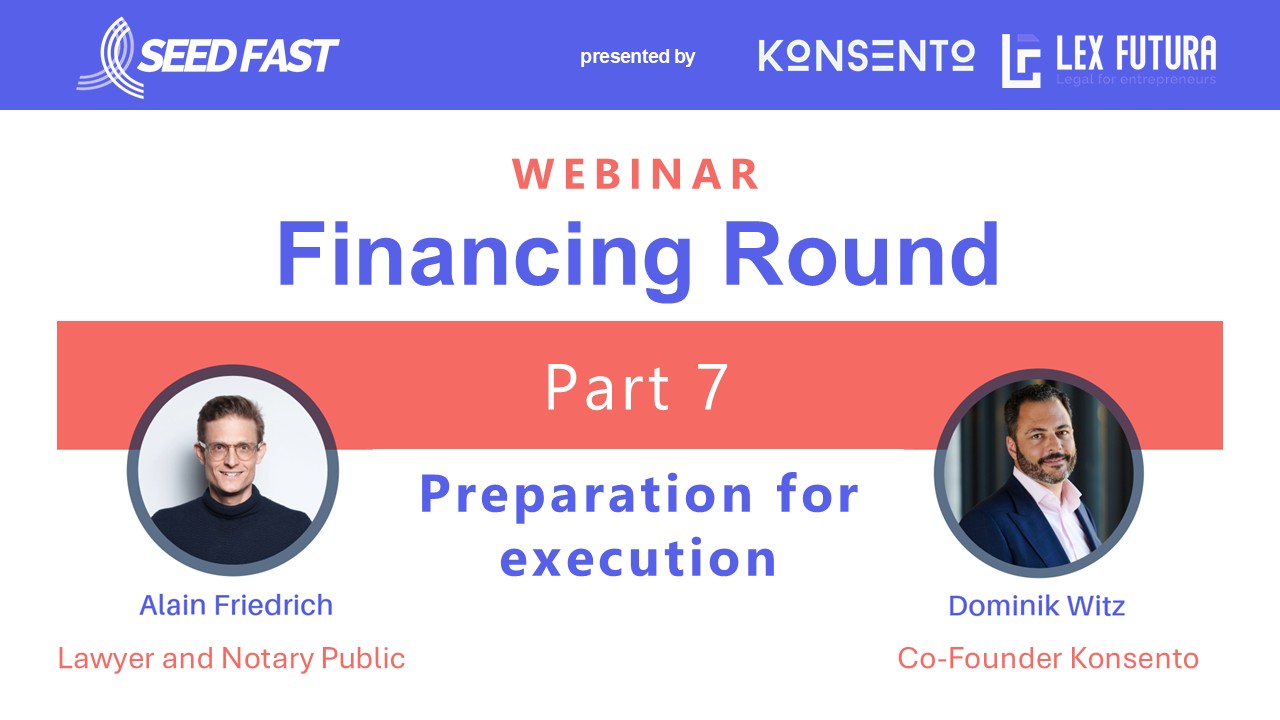After intensive discussions with investors, the preparation of the term sheet, and a successful legal due diligence, the next major milestone is approaching: the closing of the financing round. Also known as "Vollzug" in German, the closing involves various legal, administrative, and organizational tasks. Although complex, this step ultimately brings the company closer to its main goal: actually receiving the agreed capital.
What does the closing involve?
Up until this point, the company has typically not received any funds. The closing includes all formal steps required to ensure the inflow of investment funds and the effective contribution of capital to the company. A key part of this process is the formal capital increase, which must be publicly notarized. This requires:
- Notarized shareholder and board resolutions
- A certified amendment of the articles of association
Capital Increases
There are different types of capital increases (e.g., ordinary or conditional), as discussed in Webinar 2. In addition, there are two main methods of capitalization:
1. Cash Contribution (Barliberierung)
Investors pay their capital directly into a Swiss bank account held in the name of the company. Important: When opening this capital contribution account, full investor information (name, address, etc.) is required, and this information will be needed again in later steps. Investors must also complete and sign subscription forms.
2. Set-off Contribution (Verrechnungsliberierung)
Instead of cash, an existing loan (e.g., a convertible loan) is converted into newly issued share capital. This requires a certified auditor to review the capital increase report and issue a confirmation. In this case, balance confirmations are required instead of subscription forms.
Important Preliminary Considerations
Before the notary notarizes the capital increase, several key questions must be clarified, as they affect the resolutions and documents:
- Do the new shares carry special rights (e.g., dividend preferences)?
- Will existing shareholders’ subscription rights be maintained or waived?
- From when will the new shares be entitled to dividends?
- Are there transfer restrictions or an existing capital range (Kapitalband)?
- Are the new shares part of an ESOP (Employee Stock Ownership Plan)?
These considerations influence not only the shareholder resolutions but also potential entries in the commercial register.
What information must be available at the notary appointment?
The following information is needed to prepare the required documents:
- Details of the investors (including signing authority for legal entities)
- Company valuation and total investment amount – this forms the basis for determining the issue price and number of shares
- Nominal value of the shares
- Possible agio (the difference between issue price and nominal value)
- Interest and term calculations for convertible loans – including any discounts granted to the lender depending on loan duration
- Planned use of a capital range (Kapitalband), if applicable
Efficiency Through Automation
Many of the necessary documents can be generated automatically using the right tools – assuming all data is complete and correct. This significantly reduces errors, saves time, and cuts costs. This is where SeedFast, a joint initiative by Lex Futura and Konsento, comes in. From the creation of the term sheet through contract negotiation to the final closing, the entire process is supported digitally and from a single source.
You can learn more at seedfast.ch.
Sidebar: Convertible Loans – What to Consider
Must a convertible loan always be backed by conditional share capital? Not necessarily. While the law does provide for conditional capital for this purpose, in practice, conversions often take place via ordinary capital increases or within a capital range, even retrospectively.
Caution: Without conditional capital, shareholder approval is mandatory for the capital increase. To mitigate risks, it’s advisable to obtain a written commitment from the majority shareholders beforehand. This ensures they won’t oppose the loan conversion at the general meeting.
Since the 2023 Swiss corporate law reform, converted loans must be entered into the articles of association, including the name of the investor, the number of shares received, and the issue price.
Conclusion: A Structured Closing Brings Legal and Financial Clarity
The closing of a financing round is far more than just an administrative task. It provides the legal framework for the actual transfer of capital. Thorough preparation, clean documentation, and structured communication with investors, notaries, and the commercial register are key to ensuring a smooth and successful closing.
In the next post, you'll learn which resolutions are required for your capital increase — and why they're essential for registration in the commerci
Interested? Then …
… watch the video!
The Shareholders' Agreement (SHA) defines the rules between founders and investors — from governance to exit. Founders should know what they’re signing!
Then click your way into our YouTube webinar: Part 7 - Execution of a financing round | SeedFast-Webinar financing round
… read the next blog post!
In the next post, you'll learn which resolutions are required for your capital increase — and why they're essential for registration in the commercial register.
Want to know how? Then read more: Part 8 - The Right Resolutions for Your Capital Increase | SeedFast-Webinar financing round
… plan your financing round with us!
Thinking about raising capital?
We support you in making your round smooth, investor-ready and compliant – without the legal headaches.
Start your inquiry at www.seedfast.ch.
… and if you have questions: reach out to us!
This format is brought to you by:
- Konsento – the platform for legally secure company documents
www.konsento.ch - Lex Futura – the law firm for innovative legal support for startups
www.lexfutura.ch



